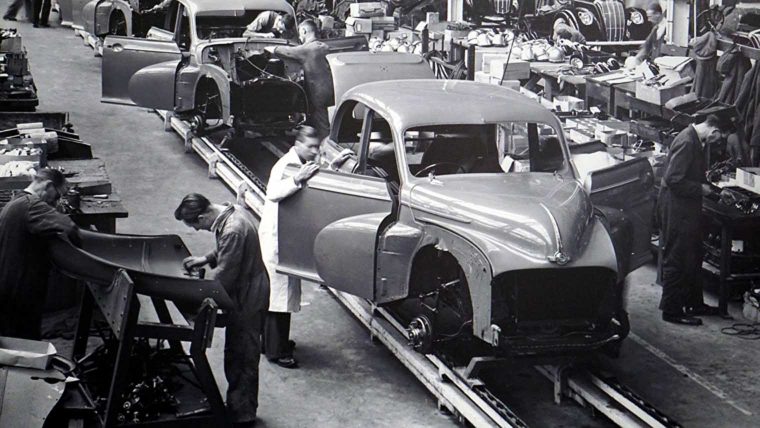- 3D Print Bureau
- 6K
- Agmatix
- Airwayz
- AKA Foods
- AM-Flow
- Appadda
- Caracol
- Carbon
- CG Trader
- Conflux
- CyberOptics
- e-Xstream
- Flamerite
- GenCell
- GreenEye
- Impossible Objects
- Incus Media
- Ineco
- InkBit
- ITG
- JPB Systeme
- KeyProd
- Landa
- LEO Lane
- Lumet
- Magic Software
- MakerBot
- Marketiger
- Nano Dimension
- Paragon Rapid Technologies
- PearlX
- Plant & Bean
- Redefine Meat
- Replique
- Ripples
- Sakuu Corporation
- Segen
- SolarEdge
- StoreDot
- Sunrock
- The Bespoke Group
- Trigo
- UltiMaker
- Xjet
Living through the revolution: How Industry 4.0 is changing manufacturing again
It is indisputable that internet-enabled “always connected” technology has significantly impacted how society communicates and interacts on a human level. The way that information is distributed and consumed is becoming more and more fragmented and personalised. Take the news for example – traditional “mass communicators” are being increasingly disrupted by independent sources offering a more individual perspective on world events.
In parallel, the growth of connected machinery – “the Internet of Things (IoT)” – is also providing incredible opportunities to change the processes and economics of manufacturing on a global level. IoT is driving new industrial processes, whereby manufacturing machines can “talk” to each other using the Cloud, conveying instructions to produce goods on-demand at the point of consumption – without requiring human intervention. This world of interconnectivity has been heralded by many as the “fourth industrial revolution”, or as more commonly known, ‘Industry 4.0’.
Manufacturing – Coming of Age
Since the advent of mechanisation in the 18th and early 19th centuries, manufacturing processes have been developed to increasingly automate and reduce manual labour. The introduction of electricity, and then robotics, enabled incredibly efficient production on a huge scale. While this manufacturing model significantly reduced the cost of production and therefore the cost of products to end consumers, there are still some inherent inefficiencies in the supply chain. Raw materials must be transported to a central production point and then redistributed in bulk to dealers and wholesalers who store the product until a sale is made. Along with the cost of transportation and storage, the time between manufacture and sale, or subsequent changes to the design, can mean that products quickly become obsolete and have to be destroyed.
Key technologies playing a role in Industry 4.0, such as additive manufacturing (3D printing), demonstrate that there is a more efficient alternative to “mass” production emerging. Couple this with internet connectivity and you have an infinitely flexible supply chain and economic model. For example, design instructions can be sent from a centralised control unit via the cloud to any number of local manufacturing plants, which in turn are fed into automated workflows that control robotics and 3D printers that manufacture and build components. Once assembled, these localised products are delivered to retailers or direct to consumers – shortening supply chains, dramatically reducing waste and decreasing logistical costs.
The Growing Role of Additive Manufacturing in this Revolution
3D print manufacture is already commonplace in STEAM (Science, Technology, Engineering, Arts and Maths) industries such as Aerospace, Automotive and Medical, where it is used for a range of applications from prototyping and tooling, right through to the production of customised end-use parts, such as medical prosthetics. Personalisation is a key benefit of the technology since it’s possible to produce low-volumes or even one-off items without needing to customise machinery or produce moulds.
3D printing is also increasingly used for prototyping consumer goods because it’s quicker and cheaper to implement design changes than in traditional supply chains. Technological advances are allowing 3D printers to produce items incorporating different materials, meaning that designers can produce parts that look, feel and function like the final product, enhancing the design process and leading to better quality products in the market.
Industry 4.0 technologies have the power to disrupt how goods are manufactured and supplied, all through the supply chain, from raw material to final distribution. 3D printing’s role in this process makes it cost-effective to supply customised goods on demand at a nearby factory to the consumer –radically reducing waste and logistical costs. Nevertheless, to make this a reality, companies will have to restructure, re-train, form new partnerships, and often fundamentally change how they do business. This could prove a huge challenge for many businesses who are entrenched in the current model and could prove devastating for companies along the supply chain whose services are no longer required.
While the mechanical and electronic aspects of connected technologies are, by their nature, not difficult to implement and use, the workforce will need to be retrained to manage digital rather than mechanical systems, and users will be distributed in multiple locations rather than a specialised facility. Being able to monitor and control the production process remotely is crucial and will require improved broadband infrastructure in many geographical areas so that systems work effectively.
Many of Incus Media’s clients are embracing and facilitating this new world. Companies such as Stratasys and Makerbot are educating a new generation of designers and engineers through school programmes, as well as professional training. Many “traditional” newspaper, packaging and commercial print companies have already integrated connected systems to automate and streamline processes in their industrial facilities. The fourth industrial revolution is upon us, and while this will require an enormous restructuring and rethinking of industrial processes, it offers a huge opportunity for manufacturing to evolve more economical and environmentally sustainable products customised to satisfy customers specific needs and desires.
-
 Since the advent of mechanization in the 18th and early 19th centuries, manufacturing processes have been developed to increasingly automate and reduce manual labour
Since the advent of mechanization in the 18th and early 19th centuries, manufacturing processes have been developed to increasingly automate and reduce manual labour
Click here to download 300dpi images



